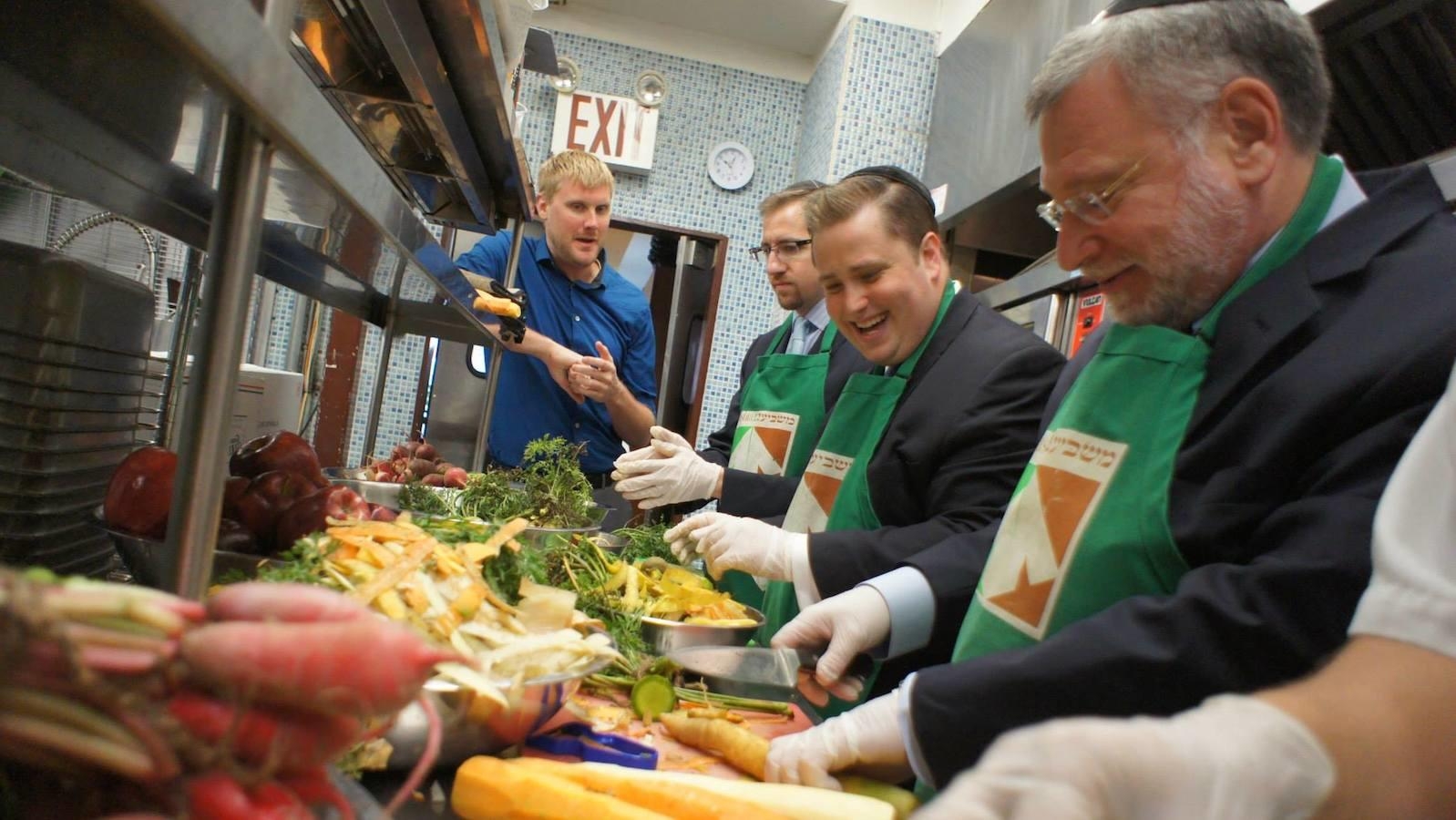Baby boomers–who represent one in four Americans–volunteer at higher rates than any other age group, according to the U.S. Bureau of Labor Statistics.
Volunteer service gives boomers a way to derive new meaning from their lives, especially as they begin moving out of the workforce. But the challenge for boomers is to identify opportunities compatible with their skills, expectations, and high educational levels, according to the Corporation for National and Community Service research report, “Keeping Baby Boomers Volunteering.”
For Jewish boomers, a specific challenge is to find meaningful volunteer work informed by Jewish values within the context of a Jewish community–and a comfortable way for less-affiliated Jews to connect to Jewish community.

Help us keep Jewish knowledge accessible to millions of people around the world.
Your donation to My Jewish Learning fuels endless journeys of Jewish discovery. With your help, My Jewish Learning can continue to provide nonstop opportunities for learning, connection and growth.
Jewish boomers who want to take hands-on action under Jewish community auspices can choose from multiple entry points, with differing levels of intensity and commitment. Options include teaching, relief assistance in disaster-stricken areas, poverty work, as well as programs for professionals with specialized skills.
When my husband retired, we began our service journey by teaching English to culturally disadvantaged middle- and high-school students in Israel. Since then, we have participated in a variety of hands-on work in the U.S. and abroad, learning and growing from each experience, while striving to make a difference.
These opportunities have been tremendously rewarding. They have also helped me gain some valuable insights on how to get the most out of the volunteer experience.
Critical Success Factors
Don’t just run blindly into any single volunteer program. Successful service requires significant advance preparation and an understanding of critical success factors. Here are some tips.
1. Define your goals. Baby boomers–particularly retirees–should seriously consider their reasons for investing leisure time in unpaid and even difficult volunteer service. Is your primary goal to visit new places, with volunteering just an add-on? Or do you aspire to fulfill a lifelong dream of contributing in a meaningful way to society? If you’re honest with yourself about your goals, you will make a better choice about what to do.
2. Consider your values. Unlike young adults, whose identities are still in formation, baby boomers with set worldviews may be less receptive to new ideas. Consider whether you want to sign up for a volunteer program that espouses values that do not mesh with your own beliefs. For instance, if you are politically conservative, you will probably not be comfortable with a program based on progressive social change. If you observe
and/or kashrut, ask in advance whether the program can accommodate your needs. Don’t automatically expect that a Jewish organization will conform to your standards of observance.
3. Evaluate your commitment and skills. Boomers bring a lifetime of valuable experience that can be productively harnessed. However, it’s important to be realistic about physical capabilities and skills, including the capacity to spend many hours a day on physically and/or emotionally difficult work. If you have never taught teenagers, think twice before signing up to teach a class solo. On the other hand, if you enjoy working with your hands, consider doing repair work on the Gulf Coast or painting houses in your own community.
4. Set realistic expectations. After working in a high-powered career, can you easily take direction, adapt to program requirements, work on a team with young volunteers, and live in non-luxury accommodations? For me, one of the greatest thrills of volunteering on an archaeology dig was working with college-age volunteers, although not all boomers may be able to keep pace with young adults or feel equally comfortable doing so.
5. Determine budget. Faced with shrinking financial portfolios, limited future earning potential, and increasing healthcare costs, baby boomers must weigh the benefits of doing good against economic realities. When volunteering at an international location, expect to invest thousands of personal dollars for airfare, accommodations, and program costs. If cost is a factor, consider volunteering closer to home. Fees vary considerably so it is important to determine your own budget up front.
6. Flexibility and humor count. Anticipate last-minute changes. Reality may not meet your expectations, as I learned when teaching Israeli high school students whose English proficiency was far lower than I had anticipated. I quickly adapted my lesson plans, scouring the Internet for elementary-school level reading materials that would still engage Israeli teens.
Getting Started
As you begin the work of identifying and choosing opportunities, it is important to understand the distinction between service learning and volunteerism.
Service learning combines meaningful community service with learning and reflection, frequently transforming both provider and recipient, according to the U.S. National Commission on Service Learning. Volunteerism focuses on the work that needs to be done, with less of an emphasis on learning and social change. .
For example, when synagogue members prepare packages at a food pantry, they are doing volunteer work. Service learning occurs when they also engage in Jewish text study about hunger, reflect on and analyze their experience at the food pantry, share what they learned with others, and work cooperatively to solve the “root causes” of hunger in the community.
While service learning in the Jewish world is presently targeted mostly at young adults as a way to nurture their Jewish identity and foster their Jewish communal responsibility, it can also be meaningful for boomers who enjoy addressing complex problems and community challenges.
If you decide on service learning and want to do it in a Jewish context, the American Jewish World Service Volunteer Corps provides substantive volunteer assignments in developing countries, where volunteers serve for two months to a year, addressing a variety of societal issues. Prior to service, volunteers participate in an orientation that includes Jewish text study relating to international development. When they return home, they are expected to advocate for community building and social change, while sharing the impact of their experience with others.
Short-term service learning programs are also available through synagogues, federations, and other organizations. The Union for Reform Judaism Mitzvah Corps is a one-week program that incorporates Jewish learning and community service work in such places as the Gulf Coast and Haiti.
Volunteer programs–available through Jewish federations, social service agencies, and other organizations–run the gamut from tutoring once a week in U.S. inner cities to teaching English in Israel over a several-month period. These programs often include training and may better suit boomers with limited time.
One organization that relies on volunteers is NECHAMA (Hebrew for comfort),
which provides cleanup and recovery assistance to homes and communities affected by natural disaster. This Midwest-based organization deploys volunteers to help victims of natural disasters across the United States.
Among the numerous volunteer opportunities in Israel are:
· Volunteers for Israel, which perform civilian-support duties on Israeli Defense Force army bases or assist in nursing/retirement homes
· CAARI, sponsored by the Jewish National Fund, which combines community service, touring, lectures, and work in the JNF forests
· Programs for healthcare professionals, such as Dental Volunteers for Israel. For information on programs for other medical professionals, including emergency medical assistance, contact the Jewish Agency.
Other Web resources for volunteering in Israel include Ruach Tova, which connects volunteers with organizations seeking volunteers, the Israel Volunteer Web Portal, and GoEco, for opportunities connected to ecology and the environment.
As baby boomers enter a new life stage, volunteering provides a new direction and a way to apply the core Jewish values of community responsibility, justice, and loving kindness. Volunteering enables boomers to transform the lives of others, achieve personal growth, and continue the journey of lifelong Jewish learning.



